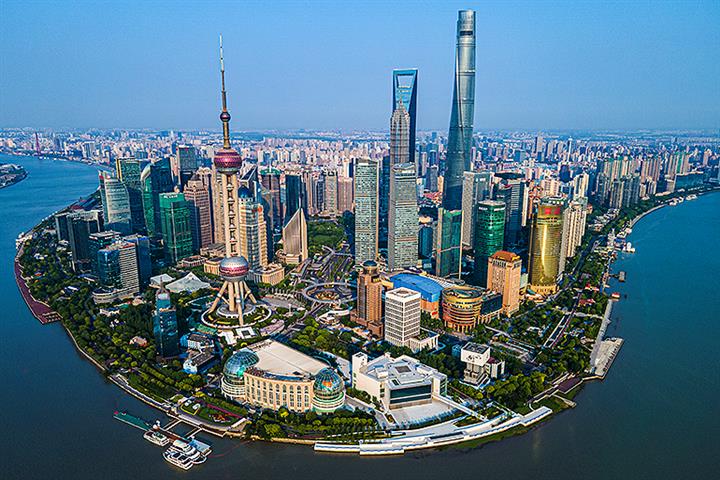 Shanghai Leads Way in China’s Opening-up by Boosting Market Access, Foreign Trade
Shanghai Leads Way in China’s Opening-up by Boosting Market Access, Foreign Trade(Yicai Global) June 13 -- Shanghai’s strengths in foreign trade and investment will pave the way for China’s further opening-up, as the country places increasing emphasis on making its markets more accessible to the world and bolstering foreign trade.
“Shanghai plays a crucial role in the opening up of the country,” Cui Weijie, vice president of the Chinese Academy of International Trade and Economic Cooperation, told Yicai Global. It is home to the country’s biggest foreign trade port, handling almost a third of all goods imported into and exported out of China. And it has the most actual utilization of foreign capital and service trade in the country.
China has just started to allow foreign shippers to move between Chinese ports, letting them participate in the country’s domestic cargo transport business. The move holds great potential for Shanghai, as it could attract more international players to use the city’s Yangshan Port as a transit hub, rather than more well-known ports such as South Korea’s Busan and Singapore.
It will help turn Yangshan Port into a global hub and improve the level of the Shanghai International Shipping Center, said Huang Yue, a member of the management committee of the Lingang New Area. The Port of Shanghai already has the greatest global connectivity of any port in the world with over 300 international routes, according to the United Nations’ Liner Shipping Connectivity Index 2021.
“Allowing overseas shippers to engage in container transport along the coast is an important way for China to develop its international transport management as well as facilitate the transportation of goods,” Cui said.
Maersk was the first to take advantage of the new ruling, sending a ship loaded with 27 containers from Shanghai to Tianjin on June 1. The Danish shipping giant has 44 ships running along six domestic routes at present and will apply to expand the business in the future, the company’s China President Wu Bingqing told Yicai Global.
“We’re starting with imports and hope to achieve two-way shipping of both imports and exports soon so that companies, ports and Chinese importers and exporters can all benefit,” Wu said.
Uncoiled Spring
“But the international environment for further opening up is getting increasingly complicated,” Cui said.
Earlier this month, the World Bank revised downward its forecast for this year’s global economic growth to 2.9 percent, a drop of 1.2 percentage points from its January projection, saying that the global economy may be in an era of long-term weak growth and high inflation. This is compared with 5.7 percent growth in 2021.
Hit by an outbreak of Covid-19, Shanghai’s foreign direct investment tumbled 40.8 percent in April from the same period the year before to USD1.2 billion while imports and exports slumped 36.5 percent to CNY219.1 billion (USD33 billion).
“There is no reason to despair, though,” said He Wanpeng, director and chief researcher of Shanghai New Bund Research Center for Emerging Industries. Like an uncoiled spring, Shanghai’s economic and social development has a high ‘stiffness coefficient.’ So long as our expectations are clear and effective countermeasures are introduced, we will triumph, he added.
The opening up of high-level institutions is a key area for further developing market access and offshore trade, Shanghai Mayor Gong Zheng said at a meeting to promote the Shanghai free trade zone on June 8.
There need to be more stress tests for the opening up of Shanghai, said He. Policies should be based on tried and tested trade rules such as the Regional Comprehensive Economic Partnership, Comprehensive and Progressive Agreement for Trans-Pacific Partnership, and Digital Economy Partnership Agreement.
No Change in Plan
The Shanghai government held five roundtables between June 1 and June 8 with industry leaders in the auto and other sectors, including special sessions with US, European and Japanese enterprises to find out more about the difficulties they face in getting back to work after a two-month lockdown and to boost their confidence in Shanghai. Some 50 policies have been recently released to accelerate economic recovery, six of which are focused on foreign investment and trade.
A ceremony was held in the Lingang New Area on June 6 to mark the start of several major projects. One of them is a new auto parts molding factory by Singapore’s Bai Terong New Energy Technology costing CNY300 million (USD45 million).
"Bai Terong, which is a supplier to car giants Tesla and SAIC Motor, used to lease factories, but this time we have acquired our own land. This shows that the firm intends to be in Shanghai for a long time and we have firm confidence in the long-term prospects of this city,” said Assistant General Manager Hua Jiamin.
Although the project was delayed due to the outbreaks, the company’s plans did not change. The new facility should start operating next April.
Last year, China accounted for 20 percent of Bai Terong’s USD1 billion revenue. “We intend to extend our footprint in China’s new energy vehicle market,” Hua said.
Editor: Chen Juan, Kim Taylor